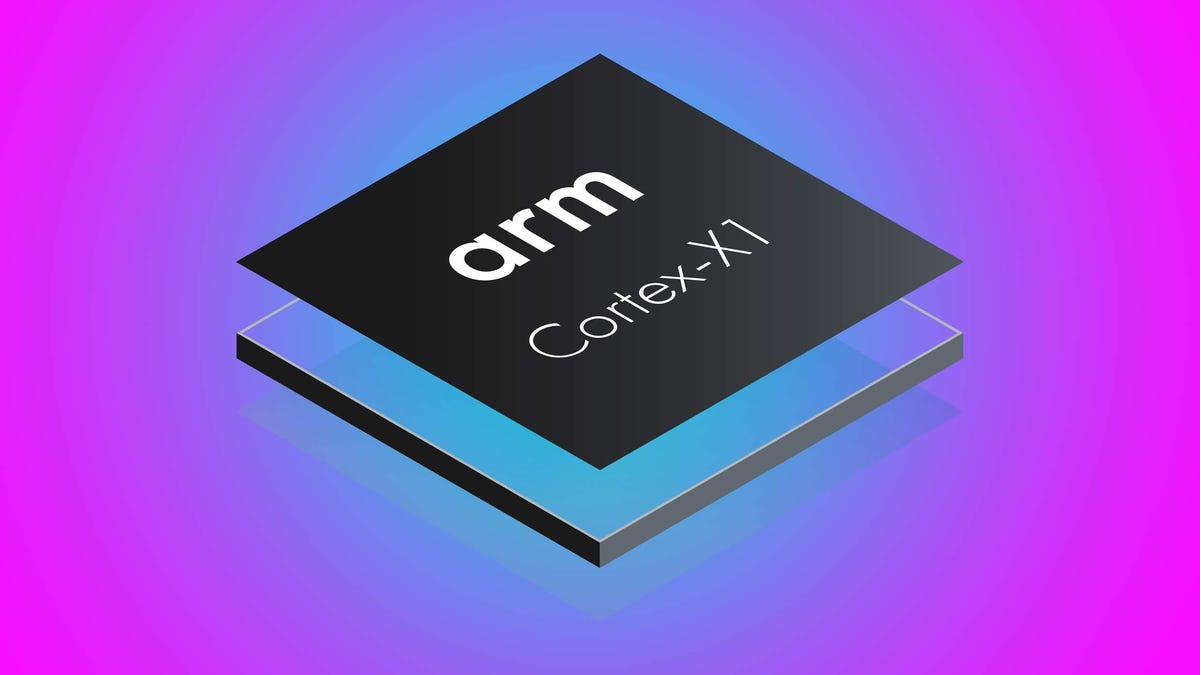Apple M1 Macs are kick-starting a new Arm-based PC era. Arm's CEO is optimistic
The UK-based chip designer, which dominates smartphones, now is trying to fix lackluster PC performance.

Arm's Cortex-X1 chip design can be customized for better performance, an approach that should be useful as Arm tries to boost its processor family in PCs.
For years, computer makers have tried to sell PCs built on Arm processors, a power-efficient family that powers smartphones . Compared with models running on x86 chips from Intel and AMD , though, Arm-based PCs have suffered from performance and software compatibility shortcomings.
Now Apple's M1 processors, the Apple-designed member of the Arm family that powers new MacBooks , are changing views of Arm PCs. The M1 chips offer not just good battery life, like Qualcomm's Arm chips in some Windows laptops , but also good performance. At the same time, x86 PCs have improved only gradually.
So it's no surprise to hear some new optimism from Arm Chief Executive Simon Segars.
"What we're starting to see now is real innovation going on in a market where there hasn't been a huge amount of innovation," Segars said in an interview during the CES 2021 technology conference. "Any time there's discontinuity that makes people question how we're doing this, that injects energy into innovation."
Part of that innovation comes from Arm itself, which is pouring new engineering resources into PC chip designs, he said. Another part could come from Nvidia , the leading graphics chipmaker that's trying to acquire Arm for $40 billion.
Arm indeed has a better chance thanks to Apple, Endpoint Technologies analyst Roger Kay said. "Arm has been talking about breaking into this market forever. I think they're on the cusp of really being able to do it. Apple's the avenue in," he said. Success for Arm would mean PCs powerful enough for mainstream buyers but efficient enough that you could leave your charger in a desk drawer for a day or two at a time with no worries.
Although Arm isn't a household name, the Cambridge, England-based company's technology powers a huge swath of the computing market. Most notably, Arm chips power just about every smartphone. They're also used in networking gear, internet-of- things gadgets , Raspberry Pi computers for hardware hackers and the world's fastest supercomputer. About 20 billion Arm chips ship each year.
See also
Intel, AMD and Apple's M1 'beast'
To succeed, Arm fans will have to reckon with new chips coming from Intel and AMD that emerged at CES. AMD's Ryzen 5000 series of laptop chips will offer up to 17.5 hours of general use on battery power, CEO Lis Su said Tuesday. Intel demonstrated its next-generation Alder Lake processor coming later this year. It adopts an approach long used in Arm chips, a combination of fast processing cores and slower, power-efficient cores.
It's been difficult to crack into the PC ecosystem of component makers, software and PC makers, Segars acknowledged. He believes Arm's combination of performance and energy efficiency ultimately will let it claim significant market share.
Arm CEO Simon Segars argues in September 2020 that Nvidia's acquisition of his company is a good idea.
Apple has proved it's possible. "The M1 is a beast with a more aggressive core design," said Tirias Research analyst Kevin Krewell. "Apple's M1 has validated that the Arm architecture can be highly performant and go toe to toe with x86."
Apple has an ecosystem advantage other Arm PC makers lack: control over the MacOS operating system, including the ability to optimize performance and ensure everything works. For Windows PC software, supporting Arm chips is typically a second priority at best, even with Microsoft's enthusiasm. Software makers can treat Arm-Windows versions of their products as optional, but in about two years, all Macs will be Arm-based.
Arm investing in new chip designs
Under its current ownership by investment firm Softbank, Arm has invested heavily in new engineering. Chipmakers can license Arm's full chip designs or just the instruction set that software uses to communicate with Arm chips, an approach that lets chipmakers design their own processors however they want.
Arm's design abilities mean there's less incentive for chipmakers to create their own designs. "There are more people licensing our CPU implementation technology than there were a few years ago," Segars said. "You have to spend an awful lot of money to do better than Arm."
Indeed, Samsung switched to Arm's Cortex-X1 design for its new eight-core Exynos 2100 mobile processor announced at CES Tuesday. Not everyone is going that direction, though. Fujitsu designed its own supercomputing chips, and on Wednesday, Qualcomm announced it acquired startup Nuvia to breathe new life into its Arm chip designs. If Nuvia technology fulfills its promise, that could significantly boost the Arm PC market, too, since Qualcomm is the primary chipmaker behind Arm-powered Windows laptops.
What's unclear is how big a problem Nvidia's attempt to acquire Arm will be for those chip licensees, which also include companies like Qualcomm, MediaTek, Huawei , Marvell and Amazon . Nvidia and Arm argue that their chip technology is complementary and well suited to next-generation computing demands. Arm has been trying to assure chip licensees that they'll be able to license Arm products as always, but the reality is that Arm will become part of a major competitor, too.
"That's a star-crossed acquisition. The industry is so averse to it," Kay said. It's likely to drive more interest into alternatives like RISC-V, a new chip instruction set that's available without Arm's licensing hurdles, he predicted.
Nvidia and Arm have given themselves 18 months to persuade regulators the acquisition is a good idea, meaning it could close in early 2022. The companies are making "great progress" convincing regulators, Segars said, but added, "All that regulatory analysis is not speedy."
Update, 9:13 a.m. PT: Clarifies that Segars was commenting on the general prospects of Arm PCs.

